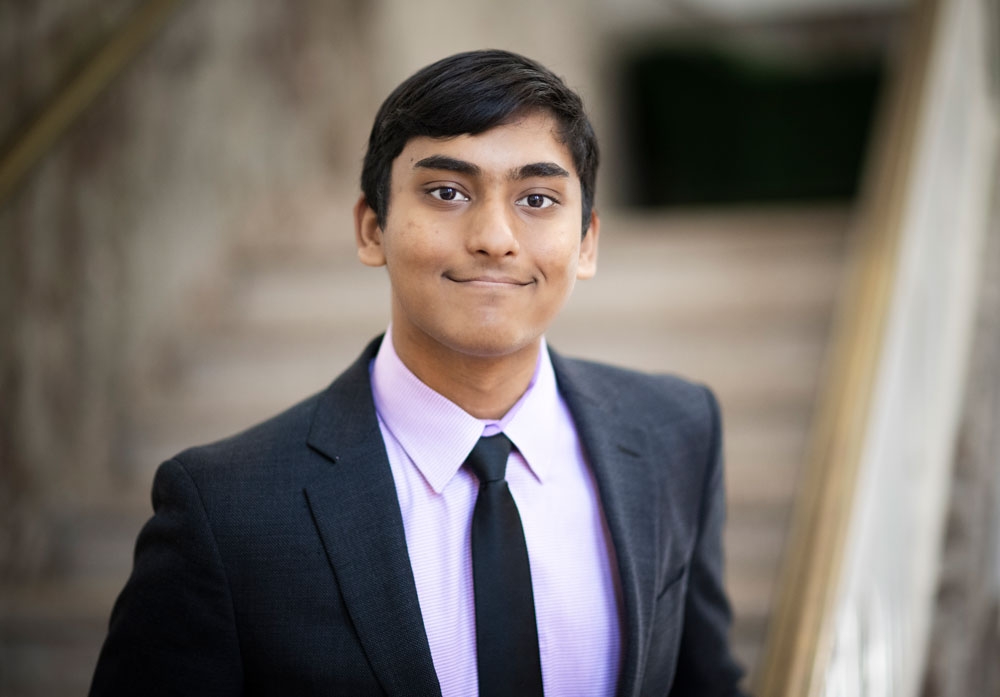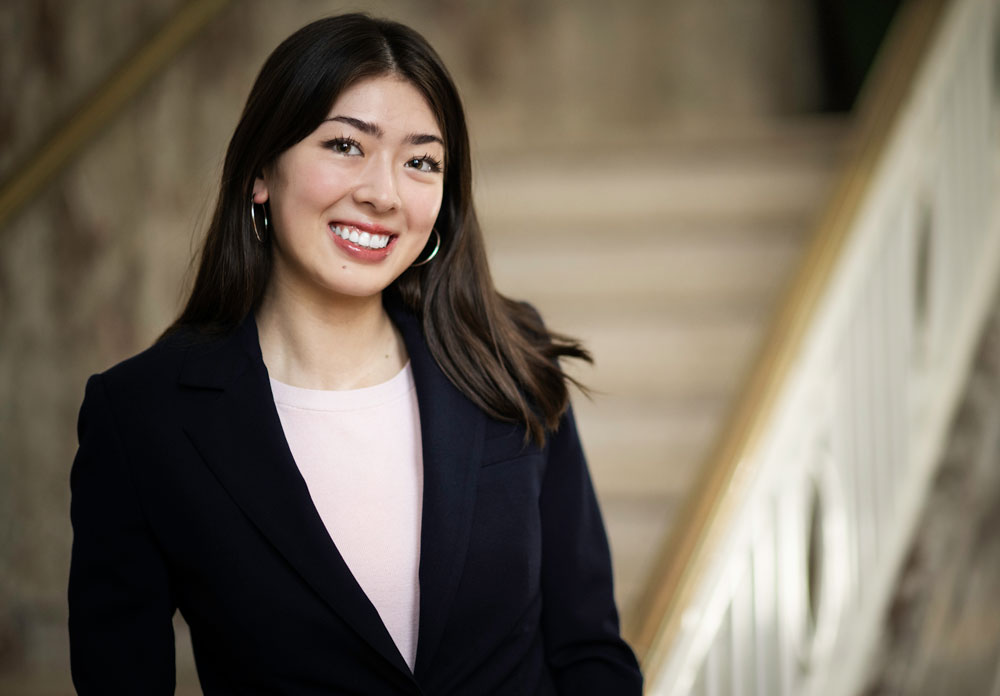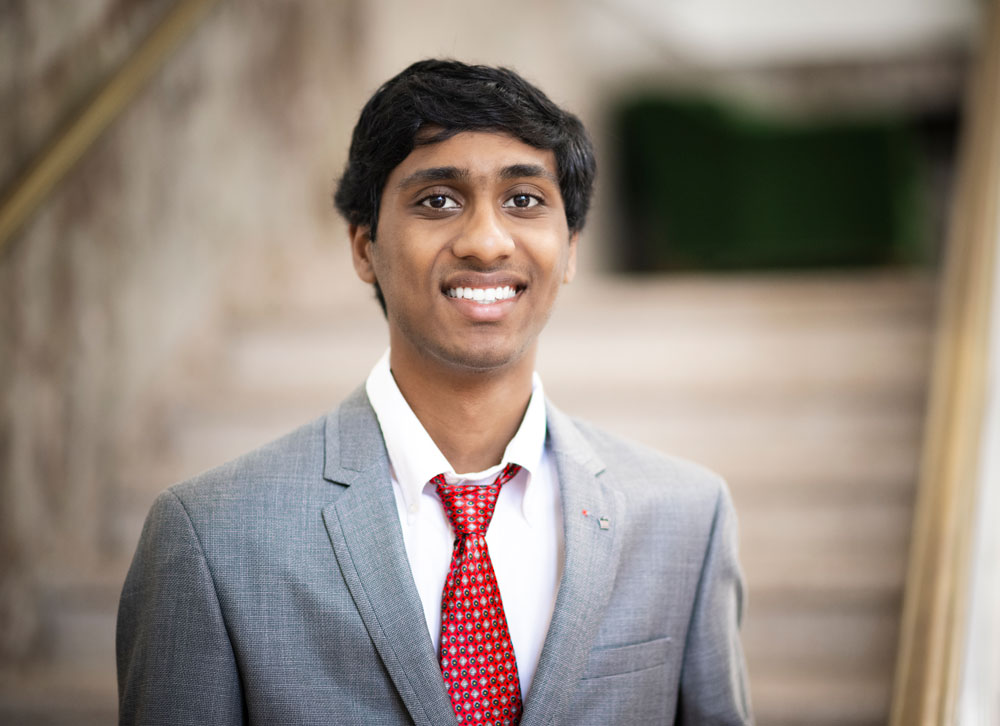The University of North Texas had three Texas Academy of Mathematics and Science (TAMS) students named as Goldwater Scholars. Anirudh Mazumder, Elliott Slaughter and Saikiran Motati are the three innovative and dedicated students who will receive the award in 2025.
The Goldwater Scholarship is a national award for students pursuing STEM degrees. Including this year, UNT has had a total of 76 Goldwater Scholars.
 Anirudh Mazumder
Anirudh Mazumder
Anriudh Mazumder has built an outstanding resume as a TAMS student. He has worked with prominent professors from around the world, including Thomas Thuruthel (University College London), Rajeev Azad (University of North Texas), Haoqi Sun (Harvard Medical School), Jaclyn Ocumapugh (University of Pennsylvania) and Yujin Park and Delia Milliron (UT Austin).
His primary research involves developing AI systems to power soft robots that can navigate inside the human body to perform tasks such as suturing tissues or delivering medication. He also implemented a biomarker discovery pipeline to analyze large-scale COVID-meta-genomic data. He also works to advocate for the wellness of kidney patients through the National Kidney Foundation and does research on kidney diseases.
“When I learned about soft robots, I thought I could use them to solve many healthcare issues,” Anirudh says. “That’s been driving my thinking ever since.”
Since joining TAMS, Anirudh has invested considerable resources, time and dedication into his research. Unsurprisingly, he’s won multiple awards and scholarships, including the Julian C. Stanley Award, authored several publications, completed an internship at the prestigious University of New Hampshire, and currently has two patents under assessment.
Anirudh has committed to Stanford University for the next leg of his academic journey. He hopes to study more ways to use artificial intelligence and causality algorithms for healthcare applications.
“Stanford is pretty much home to a lot of these thoughts and people who founded the algorithms, so I’m excited to just dive deep and better understand it all.”
 Elliot Slaughter
Elliot Slaughter
Elliott ‘Ellie’ Slaughter has built an internationally-recognized foundation in chemical engineering research during her time at TAMS. In the 2024-2025 academic year, Ellie received the TAMS Dean’s Scholarship for her dedication to her research, was recognized as a Regeneron Science Talent Search scholar, and competed at the International Science and Engineering Fair, where she won 2nd in the world in Chemistry. As a result of her time in the lab, she has also authored publications that have appeared in Journals such as Chemistry Europe’s ChemPlusChem and IEEE Xplore.
Her main project was in chemistry professor Shengqian Ma’s lab, where she devised chemical technology for direct air capture. She optimized a porous metal organic framework that captures carbon dioxide molecules in the air, ultimately building a prototype of a reactor system that uses this material to reduce harmful emissions and combat global warming.
“The UN declared that 1.5°C above pre-industrial levels is where we risk the Earth becoming uninhabitable. We’ve reached that point,” Ellie says. “It’s really important to create these technologies so we can offset all of our industrial processes.”
She also pursued research on applying a nanoporous metal organic polyhedral to sustainably catalyze the Henry-Knoevenagel reaction, which is key to forming carbon bonds used in constructing drug molecules.
“I’m grateful for UNT and I feel humbled by the experience,” Ellie says. “The freedom of innovation here has allowed me to work on exciting bleeding-edge projects.”
Ellie is incredibly thankful for her principal investigator Dr. Ma, post-doc research associate Gaurav Verma, mathematics principal lecturer Allen Mann, and the Dean of TAMS Glenisson de Oliveira for providing encouragement and mentorship throughout her journey.
While working on her research non-stop for two years, Ellie also took her talents outside of the lab. As President of Nightingale Advocacy, she encouraged students across the United States to become more familiar with and to act to better U.S. health policy. She has conducted initiatives that have led Nightingale members to send over 37,000 emails on health policy issues to elected officials and raise over $19,300 for fair drug pricing and health equity.
She also served as the President of TAMS’s Junio Technical Society, launching and organizing science camps in the Denton community that allow younger students to learn more about STEM.
“I was lucky enough to have those experiences as a kid and my parents really supported my passion for STEM,” Ellie says. “I want to pay it forward and show younger girls and BIPOC children that they have what it takes to be a scientist when they grow up.”
As she prepares to head to MIT, Ellie says she will be dedicated to the work she started at UNT as she begins “trekking onto future endeavors.” Pursuing a course load that combines chemical engineering and computer science, she aspires to dive headfirst into entrepreneurial spaces that are powered by new breakthroughs at the intersection of sustainable chemical technology and AI.
 Saikiran Motati
Saikiran Motati
Saikiran Motati has been versatile in the chemistry lab while researching some of the most complex projects. Saikiran immersed himself in thermodynamics and emergent computational techniques. He used machine learning to develop solvation models capable of predicting the properties of pharmaceutical compounds used in drug-delivery.
He concentrated on predicting solvation-free energy for solubility predictions via computational methods to “represent structures in machine-learning infrastructures.” Essentially, it involves how well a molecule dissolves in a solvent (typically water or an organic solvent) by calculating the energy change associated with transferring that molecule from the gas phase into the solvent.
Saikiran worked closely in the lab of UNT solvation chemist and professor William Acree, where he co-authored articles appearing in Physics and Chemistry Liquids and in the journal Liquids and Chemical Data Collections.
“Saikiran is a highly motivated and extremely intelligent individual,” Acree says. “Of the more than 250 undergraduate students who have worked in my research laboratory over the past 43 years, he is among the few who could transition from one research project to another on very short notice.”
Outside of UNT, Saikiran was accepted into and is now an alumnus of the MIT Research Summer Institute — a highly competitive global research opportunity that only accepts roughly 100 young researchers annually.
“At MIT, I applied my knowledge of thermodynamics and AI to develop a new predictive tool”, Saikiran says. “The machine-learning model that I developed improves the accuracy of the solubility predictions while using significantly less computing power than existing models.”
Before beginning his next chapter at Stanford, Saikiran is thankful for his time at UNT for opening doors to collaborate with others who share a passion for STEM.
“Receiving the Goldwater Scholarship has been a major milestone in my academic journey,” Saikiran says. “It holds deep value as a validation of my scientific potential, and the national recognition further motivates me to pursue impactful, high-level research.”